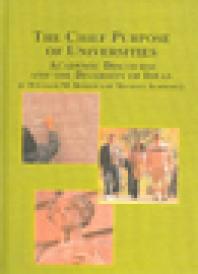
Availability
Sorry, this book is not available. Please contact your librarian about purchasing it, or search for another book.
Description
Currently not available for this book.
Table of Contents
Title page
Table of Contents
Foreword. Human Progress and Higher Education by George W. Dent, Jr.
Preface
Chapter 1. A Storehouse of Ideas
The University in a Time of Social and Environmental Crisis
Three Frames of Reasoning about Universities
The Idea of an Idea
Conservation of the Variation of Ideas
Ideas, Knowledge, and Constrained Decisions
Chapter 2. The University's Dysfunctional Side
Dysfunctionality, the University, and the Idea-Variation Hypothesis
Chapter 3. The Phenomenon of Knowledge
The Character of Scientific Knowledge
The Structure of Bodies of Scientific Knowledge
Determination of Scientific Validity
Creation, Production and Idea-Dependence of Scientific Knowledge
Chapter 4. The Advancement of Scientific Knowledge
The Theory of Evolution: From Biology to Culture
The Ideational Base as a Prime Mover of Knowledge and Society
Chapter 5. Enemy I: Authoritarianism
Authoritarianism within American Society
Authoritarianism within Universities
Chapter 6. Enemy II: Supernaturalism
Humanistic and Scientific Theories of Supernaturalism
Threats to the Advancement of Knowledge Posed by Supernaturalism
Supernaturalism and the American University
Chapter 7. Enemy III: Corporatism
A Corporate Model of the University
Quantitative reasoning
Advocacy of the Corporate University
Limits of Quantitative Reasoning and Their Implications
Who should pay for higher education?
Chapter 8. Enemy IV: Irrationalism
Three Pillars of Liberal Education
Irrationalistic ideas
Irrationalism in the U.S. University System
The Foundational Assumptions of Liberal and Irrationalist Thought
Identity Politics, Science, and Social and Environmental Problems
Chapter 9. Enemy V: Political Correctness
The Character of Political Correctness
Appropriate Constraints on Free Expression of Ideas on Campus
Rise of Politically Correct Ideas and Demise of the Right to Differ
Tension between Political Ideals and Scientific Knowledge
Chapter 10. The University in a Knowledge Economy
An Inadequacy in Past Conventional Theories and Models
Universities and Regional Economic Development
Endogenous Growth and the Idea-Variation Hypothesis
Blind Variation and Endogenous Growth
The Power of Imagination
The “Public Good” Character of Knowledge
Chapter 11. Rethinking the American University: Seven Requisites for Success
Curricular Synthesis and the Disciplinary Organization of Knowledge
Empowered University Leadership
Adequate Financial Support
Organizational Climate Conducive to Free and Open Inquiry
Psychological and Academic Factors
Library and Information Technology Services
Strong Faculty Governance
Chapter 12. Civil Society, Values, and the University
Value, Choice, and the Function of the University
Facts, Values and the Choices before Us
The Promise and Performance of American Universities
Bibliography
Index
Book Details
Title
Subtitle
Authors
and Michael, 1937- Schwartz

